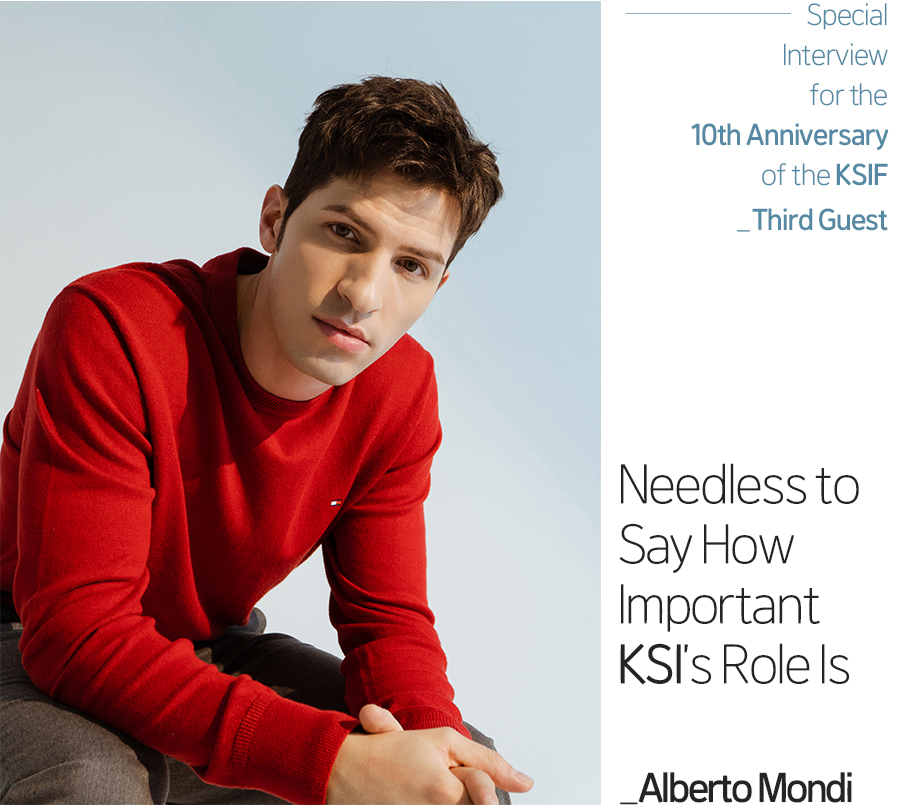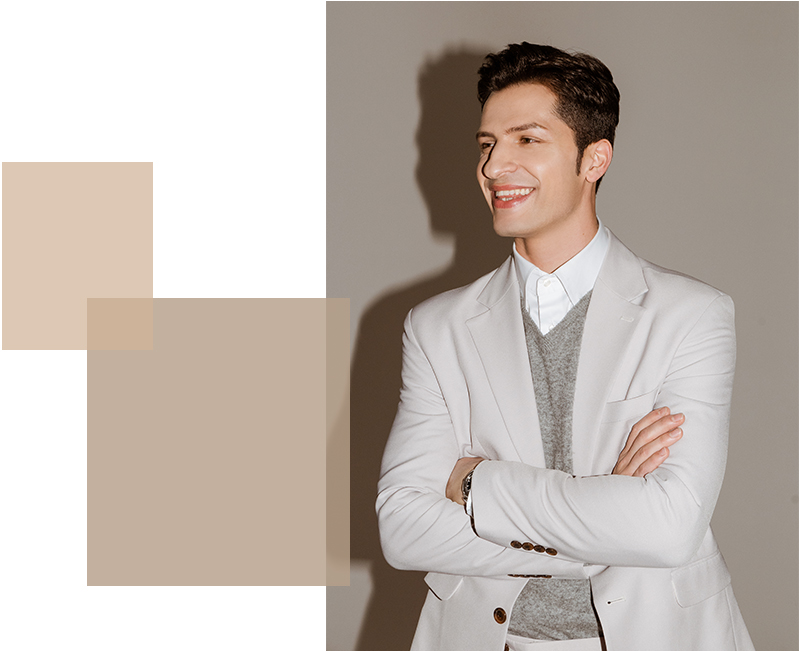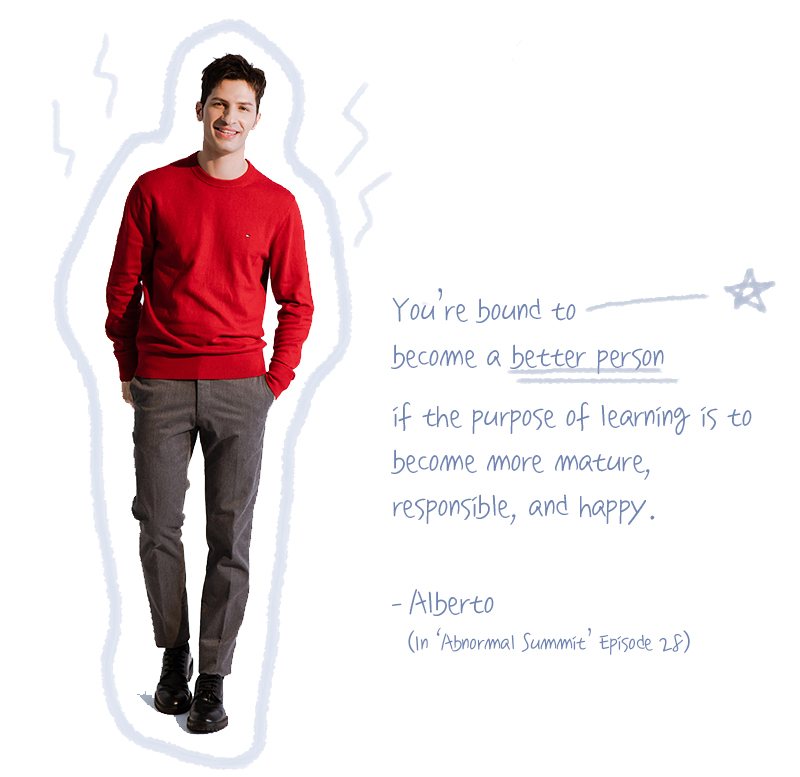Needless to Say How Important KSI’s Role Is _Alberto Mondi
Writer홍보협력팀
Tag
2022-03-17
View1085



Alberto Mondi, an Italian TV-personality who loves to experience new and varied cultures, was our third guest to interview for KSIF’s 10th anniversary. Let’s hear more about his views on Korea and the King Sejong Institute.
 I heard that you majored in Chinese in Italy and didn’t even know where Korea was located before. What are some of the things you knew about Korea back then?
I heard that you majored in Chinese in Italy and didn’t even know where Korea was located before. What are some of the things you knew about Korea back then?
Back then, people didn’t know as much about Korea as they do now. We mostly saw stories about North Korea in the newspapers and on television. However, I was familiar with Taekwondo, because all of the towns in Italy had Taekwondo academies. As you probably know, Italy even won a gold medal in Taekwondo in the Olympics. Oh, and I knew some Korean movies as well. Spring, Summer, Fall, Winter…and Spring, and Chihwaseon are examples of Korean movies well known and popular among Italians. And of course, everyone watched the 2002 World Cup games in South Korea.
 As far as I’m aware, you first started learning Korean when you came to Korea back in 2007. How did you learn Korean, and did you come across any difficulties while learning the language? Do you consider yourself a quick Korean learner?
As far as I’m aware, you first started learning Korean when you came to Korea back in 2007. How did you learn Korean, and did you come across any difficulties while learning the language? Do you consider yourself a quick Korean learner?
I first arrived in Gangwon-do because I came to Korea via the Trans-Siberian Railway (TSR) and ship. I took Level 1 and 2 classes of Kangwon University’s Korean language program, which I found very interesting and enjoyable. I listened to lectures for four hours every morning, and also had home assignments I had to complete afterwards, but I truly enjoyed it as the teacher and my classmates were all great people, so I had a lot of fun. I did have to go home and study what I’ve learned and do my homework, but there was nothing about it that I didn’t like or enjoy. I learned how to read all the consonants and vowels in just a day. Perhaps it was easier for me, because I’ve already studied Chinese and Japanese when I learned East Asian culture.

 How well do you know the KSI? What’s your view on the King Sejong Institute? Would you come and visit KSI Italy if you were a teenager living in Italy?
How well do you know the KSI? What’s your view on the King Sejong Institute? Would you come and visit KSI Italy if you were a teenager living in Italy?
Of course I now know very well about the King Sejong Institute and the KSIF (laughing). I also have a couple of friends working for the KSIF. And my wife used to teach Korean at the Korean Language & Culture Program held at Hanyang University. She also told me a lot about KSI. I’ve also heard about the KSI from an Italian professor whom I know who is teaching Korean in Venice. And I’ve participated in the World Korean Educators Conference hosted by the KSIF.
I believe that what the KSI does is extremely meaningful and important at the same time. Those who are interested in Korea naturally want to know more about the Korean language, and the KSI provides them with a great opportunity to learn Korean. What I’ve realized after studying many different languages is that it’s always best to learn from a native-speaker, although learning from a local teacher is also helpful. That’s why the KSIF’s support is significant.
And while there are people who want to learn Korean, there are others who don’t know much about Korea and the language. Some get to know about Korea through KSIs. In this regard, I believe that the KSIF plays a vital role in increasing people’s interest in Korea, and in promoting Korean culture. I think more and more people will go visit KSIs as the interest in Korean culture including BTS, Korean dramas, and movies is growing rapidly.
Actually, it can be quite lonely if you’re living in a country far away from Korea and you become interested in the Korean language and culture. I felt lonely myself when I was studying Chinese since I didn’t have many opportunities to meet Chinese people and not many people around me knew much about China. With the support of the King Sejong Institute, I’m sure those wanting to learn Korean language and culture will no longer feel lonely.
 I heard that your parents in Italy visit Korea every now and then. I’m curious to know what places or food you introduce to your parents or friends who visit from Italy.
I heard that your parents in Italy visit Korea every now and then. I’m curious to know what places or food you introduce to your parents or friends who visit from Italy.
My folks come see me in Korea often. My friend from Italy with whom I used to go to elementary school as well as my friend living in Australia all came to Korea to see me. Another friend from Spain who I met when studying in China also came to visit me. As you can see, a lot of people are visiting Korea all thanks to me! (laughing). And I have so much more to share about this topic that I can talk on and on for at least an hour more (laughing).
It’s said that Korea and Italy have a lot in common, including climate and the fact that they’re both peninsulas. In addition, Italians, as Italy also used to be a country in poverty, eat practically all kinds of food. Dishes enjoyed in Korea such as beef head meat, black pudding, intestines, and pettitoes are also enjoyed in Italy. The same goes for sashimi and beef tartare. That’s why Italians really enjoy Korean food. My parents and friends who come to Korea mostly find Korean food enjoyable.
My father especially likes seafood. So when he comes to Korea, I take him to a place where we can enjoy haecheontang. He really likes to have seafood in Korea because it’s fresh and also because the same dish with the same ingredients would cost him 200 euros (around 260,000 won) in Italy, whereas it’s only 100,000 won in Korea. On the other hand, my mother likes food that has a variety of vegetables such as bibimbap, kimchi, greens, and jJeon. And while she likes soup in Italy, she also enjoys tang or bjigae in Korea.

 We should make a new section titled “Korean food that Alberto takes his friends out to enjoy when they visit” in our Monthly Newsletter. For now, let’s move on to our next question. You were nicknamed “Alchajang” at first due to all of the diverse activities you took part in here in Korea, aside from being on television. What else do people call you?
We should make a new section titled “Korean food that Alberto takes his friends out to enjoy when they visit” in our Monthly Newsletter. For now, let’s move on to our next question. You were nicknamed “Alchajang” at first due to all of the diverse activities you took part in here in Korea, aside from being on television. What else do people call you?
I prefer just Alberto. I’m deeply interested in protecting the environment. I’ve been working hard from a long time ago to avoid using plastic containers as much as I can and fortunately, was given an opportunity to take part in an eco-friendly soap business. The company not only manufactures soap with 100% natural ingredients, but the shampoo, hair conditioner and detergent that it sells don’t come in containers. I love it even more due to the fact that the products are made by people with disabilities.
 You’re the author of Italy’s Privacy, and I Came to See You, and have translated Words from the Mustard Seed and My Own Star. Four books have already been written or translated in your name. Now, writing your own book must also be difficult, but translating an Italian book into Korean also doesn’t sound like an easy task. What are some of the difficulties you come across when working as a translator?
You’re the author of Italy’s Privacy, and I Came to See You, and have translated Words from the Mustard Seed and My Own Star. Four books have already been written or translated in your name. Now, writing your own book must also be difficult, but translating an Italian book into Korean also doesn’t sound like an easy task. What are some of the difficulties you come across when working as a translator?
I’ve been writing columns since when I was in Non-Summit. I wrote a column for the JoongAng Daily titled “Perspective of a Non-Summit,” and another column on soccer for Naver Sports. Perhaps that’s why a publishing company reached out to me saying they want to publish a book with me. But my book wasn’t written by me alone. There were people who’ve helped with proofreading ever since I’ve started to write columns. And when writing my book, I met with Korean authors every week to help read, write, and modify what I’ve written. It really would have taken me 10 years if I had to write a book on my own (laughing). Writing a book in a foreign language is extremely hard. Writing a book without making any grammatical or spelling mistakes is easy. However, capturing the nuance and conveying what I want to say in expressions that native speakers find enjoyable and easy to understand is the tricky part. For example, I had a Korean author and a priest proofread my book, Words from the Mustard Seed, because I had to get help from experts on proverbs, idioms, onomatopoeic words, and mimetic words.
 You said you used the Trans-Siberian Railway and a ship to travel from Italy to China, and then from China to Korea. You must have met a lot of people from various backgrounds in the process and experienced their culture. Is there anything we should keep in mind when coming across an unfamiliar culture?
You said you used the Trans-Siberian Railway and a ship to travel from Italy to China, and then from China to Korea. You must have met a lot of people from various backgrounds in the process and experienced their culture. Is there anything we should keep in mind when coming across an unfamiliar culture?
It"s simple. There’s no right or wrong. You may think something’s is right, based on what you’ve learned and experienced throughout your life, but that may be wrong from the viewpoint of others. It’s always important to put yourself in someone else’s shoes. Of course, you may not completely understand other cultures and may have some level of prejudice, but at the end of the day, what’s important is to show respect for differences, instead of treating them as if they’re wrong. I personally love meeting people from different cultures. For me, experiencing and getting to know how diverse the world is through those people is always exciting. I mean, as long as they’re not from cultures that have no respect for human rights.

 Your son, Leo, with whom you were on television is loved by many and speaks both Korean and Italian. Did something interesting happen when he was learning both languages that you’d like to share with us?
Your son, Leo, with whom you were on television is loved by many and speaks both Korean and Italian. Did something interesting happen when he was learning both languages that you’d like to share with us?
There are indeed a lot of interesting episodes. He speaks Italian with me and Korean with his mother. But when he’s talking to me in Italian, he suddenly says, “Dad! Dad! Let me tell you a funny story!” in Korean. So, he may be more comfortable speaking Korean as he grew up in Korea and uses it more often.
He sometimes uses both languages at the same time. He reads a lot of Italian books with me and knows all the tricky Italian words. When he sees a planet or star, or a scientific term in a children’s science book, he uses Italian words instead even if he is talking in Korean. And sometimes when the other children at the playground say, “Hi, how are you?” to Leo in English, because he doesn’t look like an ordinary Korean kid, he says “Why do you ask?” in Korean (laughing).
And recently, he started to correct our Korean accent. For example, if I say “toy dinosaur” when I’m talking to his kindergarten teacher in Korean, he would correct me, saying that I should pronounce it “dinosaur,” instead of “dinosor.” Likewise, he corrects his mother’s Italian accent as well. I think he points out our mistakes at least once a day every day nowadays (laughing).
 You have your own YouTube channel, “Alberto Mondi” on which you talk mostly about soccer and cooking. What made you want to create your own channel, and what are your plans for it going forward?
You have your own YouTube channel, “Alberto Mondi” on which you talk mostly about soccer and cooking. What made you want to create your own channel, and what are your plans for it going forward?
I actually have one more channel aside from Alberto Mondi called “354” which I’ve created with friends from Non-Summit. The reason I created this channel was because of Covid-19. I had three TV shows I was supposed to shoot abroad scheduled, but they were all cancelled due to the pandemic. So were all the other events and lectures. So, I started my own YouTube channel after consulting with my manager as I’m not the type of person who can just sit around and do nothing. However, I found that being a YouTuber is different from being a TV personality. That’s why it’s still new to me.
And another thing I like about my channel is that it focuses on information sharing. It not only helps me study, but also can function as a bridge between Italy and Korea. I once received a call from the Consulate of South Korea in Italy. They wanted me to create a video introducing Korean food, culture, history, and historical figures in the Italian language. I did my best and sent my video over to them. They really loved it, which made me feel proud. Many people from Italy reached out to me after watching the video.
 Last but not least, do you have your own tips for learning Korean that you would like to share with our KSI students who are studying Korean language and culture? Is there something you would like to tell them?
Last but not least, do you have your own tips for learning Korean that you would like to share with our KSI students who are studying Korean language and culture? Is there something you would like to tell them?
You have to increase your exposure if you want to learn any language, including Korean. The reason why I was able to learn Korean fast is because I put myself in an environment where I had to use Korean often. I watched the news every day, although I couldn’t quite understand it, and listened to Korean songs. I also read a lot of Korean poems as they were easier to understand than long sentences. I even joined an early morning soccer club (laughing) and attended the after-parties. I just sat there listening although I couldn’t understand what any of the early morning soccer club members were saying. But over time, I began to understand.
I don’t have a great Korean accent and didn’t have a lot of time to study. However, one thing to note is everyone has their own weaknesses when learning a language. For example, others may find reading and writing more difficult. What I want to say today is that you can do it as long as you keep trying and don’t give up. And language is extremely important for learning Korean culture, so my advice for your readers is to keep studying Korean.


